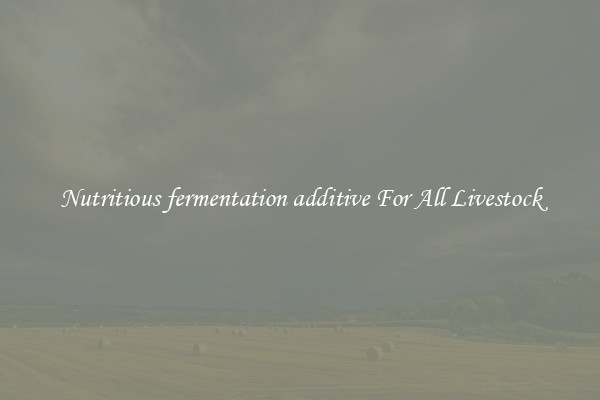Nutritious fermentation additive For All Livestock
A well-balanced diet is crucial for the health and productivity of livestock. In recent years, there has been a growing interest in using fermentation additives to enhance the nutritional value of animal feed. These additives play a vital role in ensuring that all livestock, including poultry, swine, and ruminants, receive the necessary nutrients for optimal growth and performance.

Fermentation additives are natural microbial cultures that are added to animal feed during the fermentation process. These cultures help convert raw materials into a more digestible and nutrient-rich form, making it easier for livestock to absorb essential nutrients. The resulting fermented feed has a wide range of benefits for animals, including improved digestion, enhanced gut health, and increased nutrient uptake.
One of the key advantages of using fermentation additives is that they significantly enhance the digestibility of feed. The fermentation process breaks down complex carbohydrates, such as cellulose and hemicellulose, into simpler sugars that are more readily absorbed by the animal's digestive system. This leads to higher feed conversion efficiency and ultimately reduces the amount of feed required to meet the animal's nutritional needs.
Furthermore, fermented feed promotes better gut health in livestock. The addition of fermentation additives to feed creates an environment where beneficial bacteria thrive. These bacteria help maintain the balance of microflora in the animal's gut, which improves digestion and prevents the growth of harmful pathogens. A healthy gut not only enhances nutrient absorption but also boosts the animal's immune system, making them more resistant to diseases.
In addition to improved digestion and gut health, fermented feed provides a higher nutrient density compared to traditional feed. The fermentation process increases the availability of vitamins, minerals, and amino acids, which are essential for growth and reproduction. This results in healthier and more productive livestock, with improved weight gain, higher milk production, and better egg quality.
Furthermore, the use of fermentation additives is not limited to specific livestock species. Whether it's poultry, swine, or ruminants, all types of animals can benefit from the nutritional advantages of fermented feed. This makes it a versatile additive that can be incorporated into various livestock farming systems.
In conclusion, fermentation additives offer significant benefits for all livestock by enhancing the nutritional value of feed. These additives improve feed digestibility, promote gut health, and increase nutrient uptake, leading to healthier and more productive animals. As the demand for sustainable and nutritionally optimized animal production increases, fermentation additives provide a viable solution to meet these requirements. By incorporating fermented feed into their diets, livestock farmers can ensure the overall well-being and performance of their animals, contributing to the sustainable growth of the industry.

View details

View details

View details

View details






